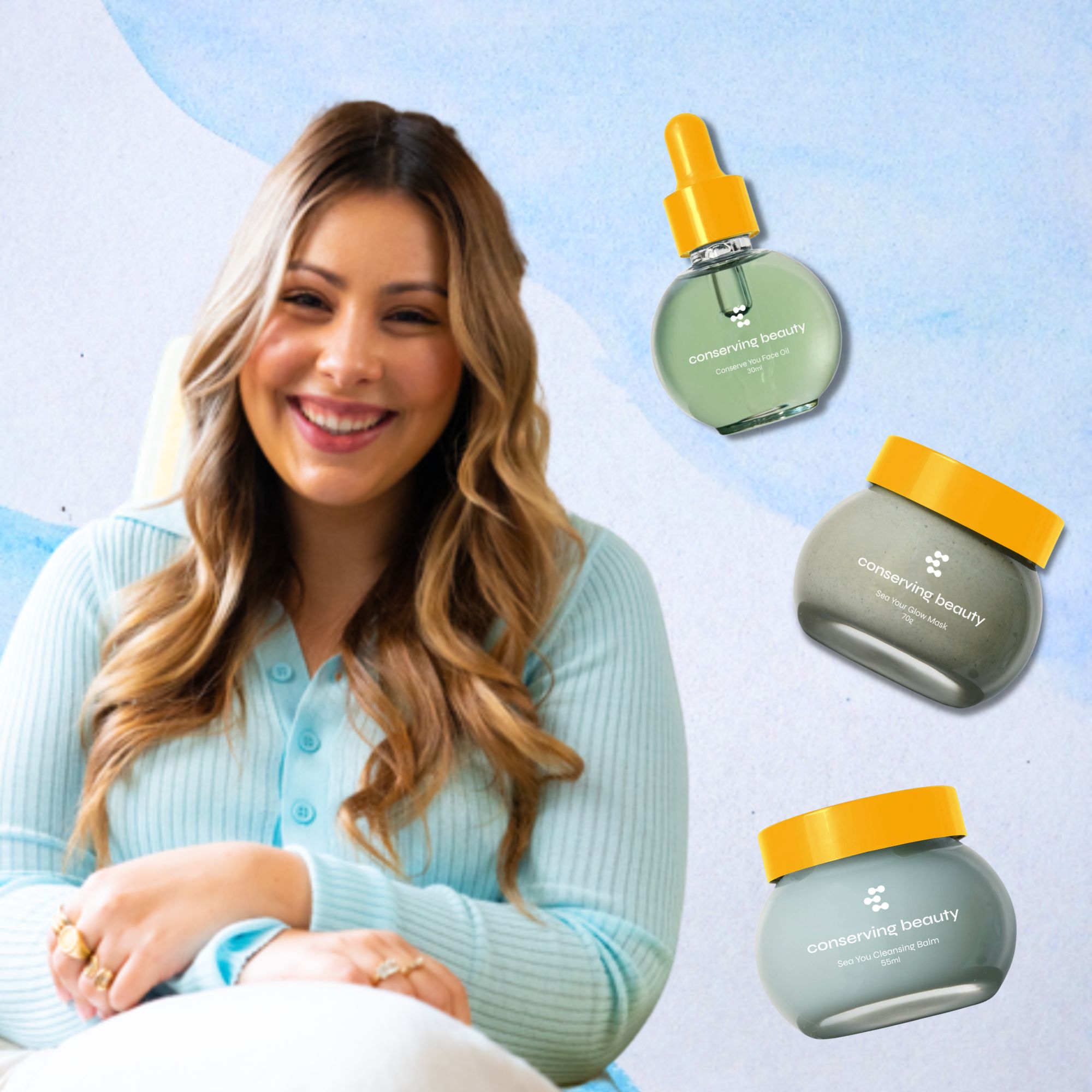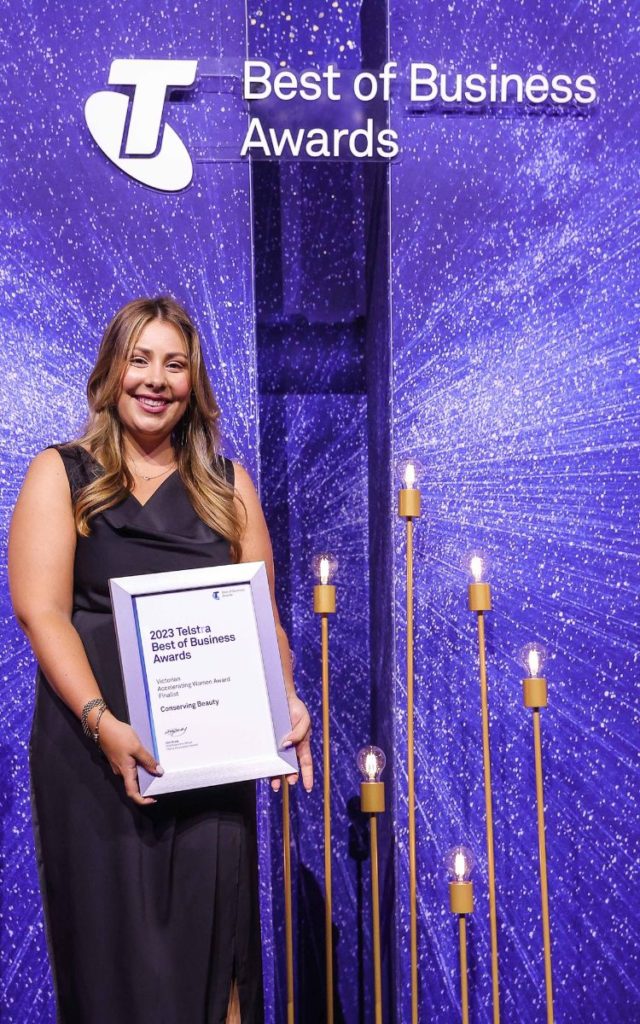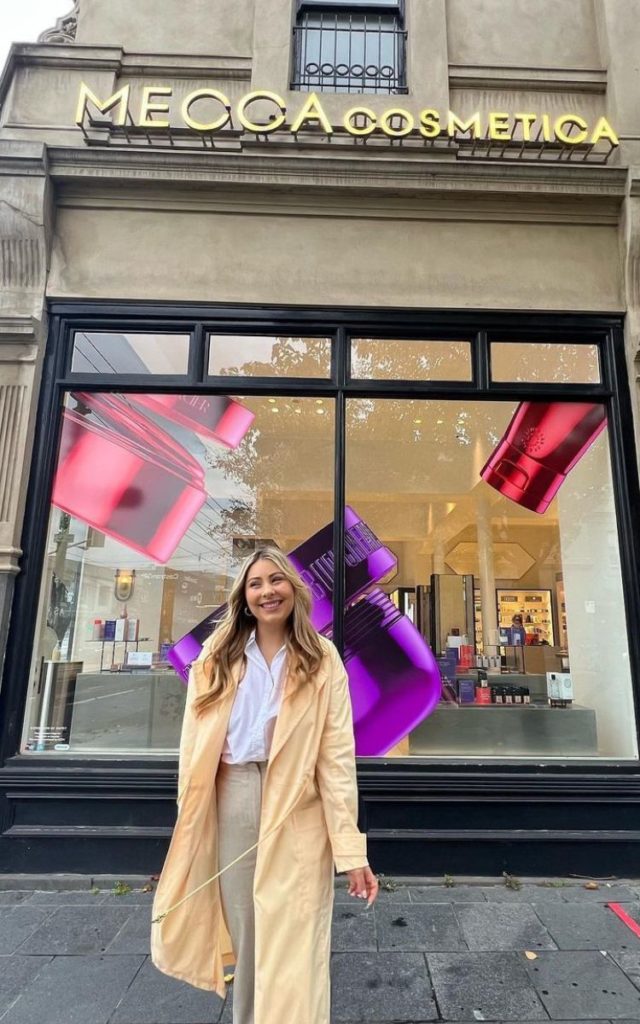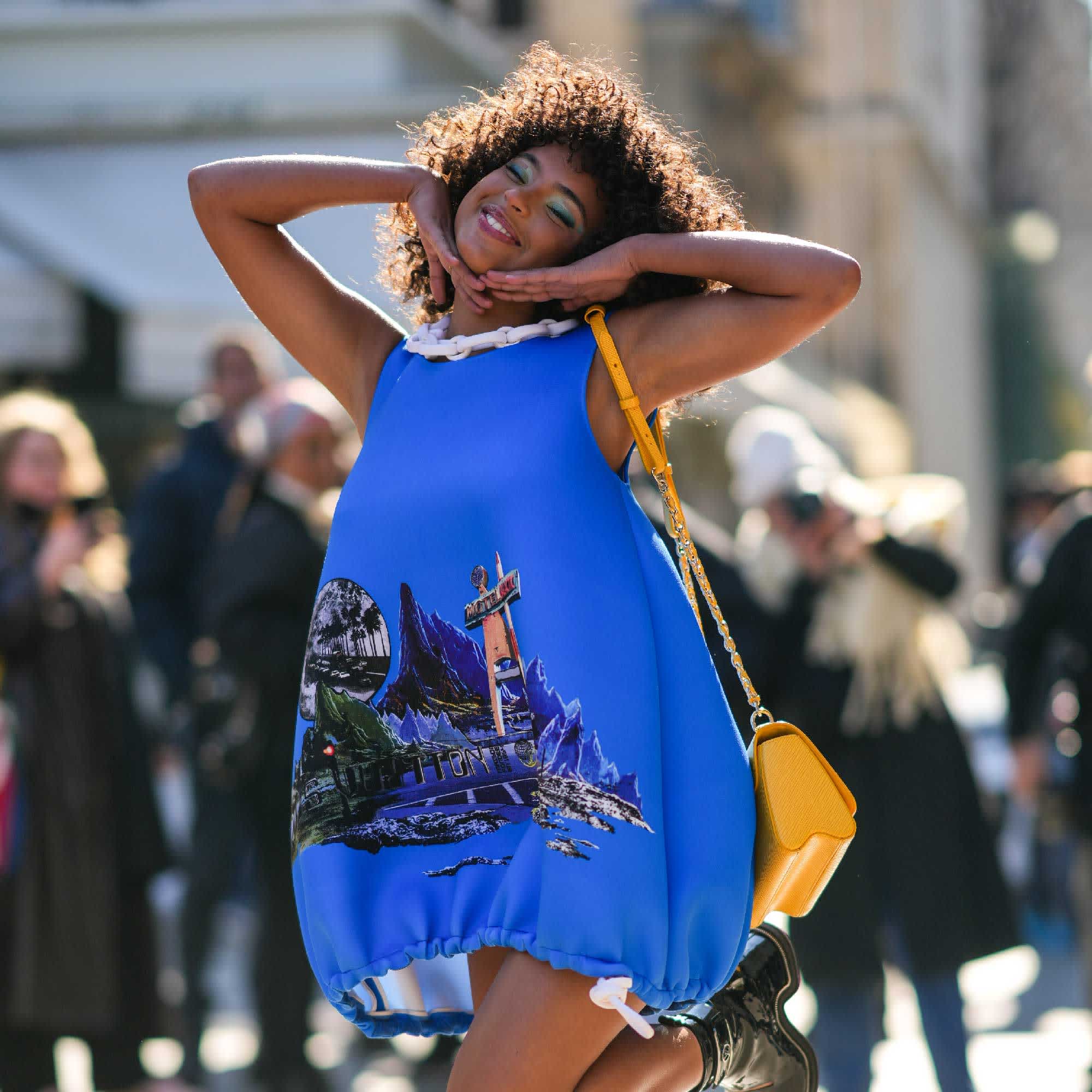
- POPSUGAR Australia
- Beauty
- Is Work-Life Balance Just Another Unrealistic Ideal For Women? This Beauty Founder and CEO Says Yes
Is Work-Life Balance Just Another Unrealistic Ideal For Women? This Beauty Founder and CEO Says Yes

For International Women’s Day, POPSUGAR Australia sat down with Aussie women excelling in the ever-evolving business of beauty. We picked up tips, tricks and the secret to surviving and thriving in business.
Natassia Nicolao is the CEO and founder of Conserving Beauty and a Victorian State Winner in the Accelerating Women category of the 2023 Telstra Best of Business Awards. We spoke to Natassia about combining social impact with her passion for beauty, managing a start-up team, and what we mean when we talk about “work-life balance.”
Popsugar Australia: What were your greatest interests growing up, were you always beauty obsessed?
Natassia Nicolao: I was always super passionate and involved in social causes and volunteer work. When I was in high school, I led our Social Justice club. I volunteered weekly with several non-profits, including Very Special Kids, Red Cross, and Sony Star Camp. I became interested in ethics and equality, which led me to petition the swap to Fair Trade Coffee and Tea in my school’s canteen. I was so excited when I got it over the line!
Whilst I loved impact, I also loved beauty products as a self-proclaimed MECCA beauty junkie. At that time, I didn’t know that impact and beauty could intersect. Reflecting on my interests growing up, it makes sense that I eventually created a business that is half an impact company and half a beauty brand.
PS: When you think about words typically associated with entrepreneurs, what are they and do they resonate with you?
The words that come to mind that resonate for me are “hustler,” “hard-working,” and “don’t take no for an answer.” I pride myself on my work ethic and hustle mentality, which I was taught by both of my immigrant parents. They sacrificed everything to help give my sisters and I the best life possible. We have always worked so hard and that’s been an integral part of my entrepreneurial spirit.

Related: 5 Women in Male-Dominated Industries on Their Experiences with Gender Bias in the Workplace
PS: What was your background before starting your business?
NS: I studied a Bachelor of Science, majored in Biochemistry at University, and then worked at some of Australia’s leading beauty and wellness companies. My roles were predominately in ethical sourcing, sustainable supply chains, and product development. They ultimately helped shape my career and inspired me to create Conserving Beauty.
PS: Where did the idea for Conserving Beauty come from?
When I started working in supply chain and product development, I knew I wanted to merge impact with beauty products. After seeing so much greenwashing and no solutions that could be equally great for our skin and planet, I decided to map a product lifecycle from start to finish to look at ways to reduce our environmental footprint.
I realised the beauty industry relies heavily on water at every stage of the product lifecycle. Most products are filled with 70%-90% water. Water conservation should be a focus for all of us. With guidance from the United Nations Sustainable Development Goals and the declared Water Action Decade, we reimagined a standard beauty product’s lifecycle to conserve our most precious resource – water.
I used to put a lot of pressure on myself for not having enough balance because friends and family tend to point it out when they feel neglected. But I realised that it’s an unrealistic ideal and not a healthy way to look at my life because it implies I’m not doing either right and that it’s wrong for me to be a workaholic.
Natassia Nicolao, Founder and CEO Conserving Beauty
PS: What was the Conserving Beauty journey, from concept to fruition?
NS: The final concept was to develop innovative products that helped our skin and saved water while reducing carbon emissions and preventing waste from entering landfill.
From my initial idea, it took me almost two years to formulate, build a supply chain, start our water research project, lock in impact partners, and write a business plan.
During these two years, I had a full-time 9-5 job. This period of my life was equally chaotic and exciting. I was working seven days and round the clock to make my side hustle my main job and ended up quitting my 9-5 shortly after we launched.
The first two years of the business were admittedly very lonely as it was only me. Fast-forward to now, I have had the most incredible journey hiring my brilliant team. We are a small team of five people plus four external board members and five investors.
Related: Sustainable Beauty Is a Confusing Game – Here’s a Guide to the Terms You Need to Know

PS: How do you work with your team, and what is your day-to-day like?
NS: We work out of a creative co-share workspace called The Commons in Melbourne. Being in a startup, there are no two days that are the same. We work in a flexible style and cross-collaborate in all areas. We work in a positive solutions-focused mindset and always think of bringing innovation to the forefront, whether in product, design, marketing, or impact.
A typical day starts around 6:00am for me and ends around 11:00pm.
I’m usually in the office between 8:30am – 6:00pm, but that changes depending on our early morning calls with the US or late-night meetings with the UK. We always try to have joy and fun during the work day, so we break for lunch, coffee, and workouts. Because we are a small, tight-knit team, we enjoy each other’s company. I find that having a happy work environment is crucial to the business’s success because if the team are rested, focused, and motivated, we will all work together to get the best outcomes and solutions.
Related: Why Gender Equality Is Not Just a Women’s Issue
PS: Poeple like to talk about work-life balance, is that something you set store by?
NS: I used to put a lot of pressure on myself for not having enough balance because friends and family tend to point it out when they feel neglected. But I realised that it’s an unrealistic ideal and not a healthy way to look at my life because it implies I’m not doing either right and that it’s wrong for me to be a workaholic.
I love my job, I love my business, and of course, it consumes the majority of my thoughts and hours in my day, and I changed my mindset that there is nothing wrong with that. The minute I stopped putting pressure on myself to seek ‘balance’, I started to enjoy life more. I still see my family and friends without the unnecessary guilt and expectations others tried to project onto me.
That said, looking after myself is important! This is an area that I try to improve on because I tend to put the business needs before my own, which is not great. Instead of trying to have heaps of wellness goals, I focus on one, which is sleep. When I’m well rested, my decisions are better, my mood and mindset are better, and even my skin is better, so ultimately, this will positively impact my team and business.
Outside of this, I like to work out with my team a few days a week and drink 2-3L of water each day.
PS: What have your proudest moments been as a business owner and founder?
NS: There are three that come top of mind.
- The first one is building a startup rooted in purpose, which helped me attract the most talented team who joined the journey with me. Startup life can have negative connotations with burn-out and exhaustion. I’m proud that my team has a wonderful work life and doesn’t have to sacrifice their personal life, mental health, or physical health in the process.
- Because of our work in impact and innovation, Conserving Beauty is the first beauty brand globally to have environmental impact funds as investors. This is an incredibly proud moment because it validates all of our work to build a traceable supply chain and help conserve water, carbon and waste.
- Within the first eight months of launch, we were in MECCA stores across Australia and New Zealand and in the UK with Cult Beauty. Every time I go into a store and see our innovation on shelves, I still get goosebumps. Especially when so many people told me it would never happen so early in our journey.
PS: What is the toughest thing about starting and running a business?
NS: Founder life is an emotional rollercoaster and not glamorous. We carry the stress and pressure and are constantly fixing and problem-solving, which can be exhausting.
The hardest part for me is taking time to look after myself. Putting everyone else’s needs before my own is easy – our customers, teams, investors, retailers, and suppliers. I’ve learned that if I don’t look after myself, I can’t look after anyone else that is important to me inside and outside of the business
There are so many great days and some really tough ones as well. I spend most of my time managing my team, running operations, product development, finance and cash flow, or impact reporting.
Basically, the opposite of my team who have so much fun on the creative and marketing side. In saying that, there isn’t a moment where I don’t love it, and I have to sometimes remind myself on the hard days that I need to enjoy it more because I’m living the dream I always wanted.
Female entrepreneurs are incredible, resilient, smart and solutions-oriented, yet they still don’t have the support they deserve. For example, less than 1% (0.7% to be exact) of venture funding went to women-founded startups in Australia in FY22, according to SBE Australia, and the share of total capital that went to women founders was the lowest in years, according to a recent report.
Natassia Nicolao, Founder and CEO Conserving Beauty
PS: What are some things you wish you’d anticipated before getting your start in business?
NS: Because my background isn’t marketing, I didn’t anticipate how important marketing, copywriting and content creation would be. I’ve learned that having amazing disruptive products and a legitimate impact is not enough if no one knows about it or our messaging and marketing aren’t resonating and connecting with people.
Related: How a Beauty Editor With 20 Years Experience Found an Important Gap in the Fragrance Space
PS: When you think of challenges facing women in business in 2023, what springs to mind?
NS: Female entrepreneurs are incredible, resilient, smart and solutions-oriented, yet they still don’t have the support they deserve. For example, less than 1% (0.7% to be exact) of venture funding went to women-founded startups in Australia in FY22, according to SBE Australia, and the share of total capital that went to women founders was the lowest in years, according to a recent report.
This is despite women-led businesses delivering more than twice as much revenue per dollar invested than startups with all-male founding teams. I found it hard to raise capital as a young female entrepreneur in beauty and impact and had a lot of preconceived notions with investors based on my appearance and age that my male counterparts didn’t have.
PS: What are some challenges facing the beauty industry as a whole in 2023?
NS: Whilst there are challenges, including increasing greenwashing claims, lack of transparency and product traceability, and the demise of ‘clean’ and ‘natural’ beauty, there are also so many startups, indie brands, and even beauty content creators who are creating meaningful change and bringing science and authority back into the industry.
Consumers are extremely smart and have access to information, making it a lot easier to hold creators and brands accountable. If anything, I’m actually excited to see the positive changes continue to progress in the next few years within the beauty industry.
PS: As a leader, what are some lessons you’ve learnt in people management?
NS: I’ve managed people throughout my career and still do within my business. Still, my approach has changed since leading a startup. We have a flat structure as we’re still a small team so while I don’t directly manage everyone, I still have an impact on their workload.
I choose to lead by empowering everyone to make their own decisions and have ownership of tasks and projects. However, they always know I’m here to help if they need it or if their workload is too much. I believe in creating a motivating, uplifting, and positive space to keep everyone inspired and happy to come to work. It also helps to have a mission everyone wants to be part of because we are all working towards the same larger goal.
PS: Would you describe yourself as a naturally confident person, or is it something you’ve had to work on?
NS: Yes and no. I’m confident in our mission, our products, and our brand.
Still, at the same time, I constantly fight the internal imposture syndrome and ‘im not a good enough CEO’ thoughts on a daily basis. It’s something I’m struggling with so I often speak to a few mentors and business coaches about it to help me overcome this.
My main tip is that it’s okay to ask for help and to create a group of people around you that can help you. It’s essential to have a mixture of mentors, business coaches, a psychologist, family, and friends. I often go to all these people and ask for help regularly because these feelings are natural and part of the learning process.


